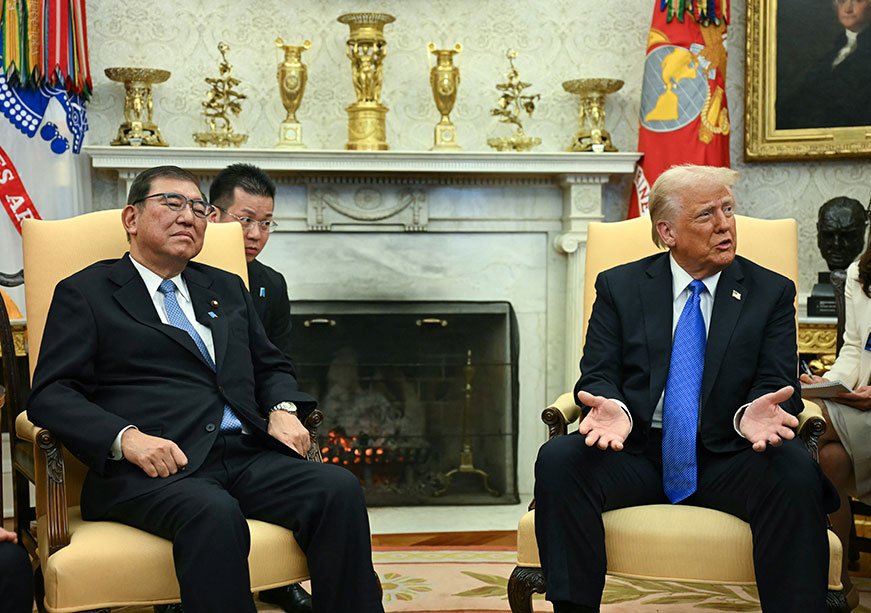-
CENTRES
Progammes & Centres
Location
Ishiba’s first meeting with Trump reinforced the US-Japan alliance, securing a vital diplomatic boost amid domestic political struggles

Image Source: Getty
On 7 February 2025, Japanese Prime Minister Shigeru Ishiba met with United States (US) President Donald Trump during his three-day visit to the US—his first trip to Washington as Japan’s Prime Minister and Trump’s second meeting with a foreign leader. The meeting underscored the commitment of both Washington and Tokyo to strengthen their alliance amidst evolving geopolitical dynamics.
Successive Japanese governments have regarded the timing of their leader’s meeting with the U.S. president as a key indicator of Japan’s importance in Washington’s strategic priorities. However, this meeting was vital for Ishiba, not just from a diplomatic perspective but also for scoring a political win, which is crucial for him at the moment. At home, Ishiba’s minority government has been in a precarious position after suffering a major setback in the October 2024 elections when it lost its ruling majority. Ishiba’s meeting with Trump was aimed at securing a political victory on the international stage. His ability to handle President Trump had been widely debated in Japan, with media speculating that he would struggle to build rapport with the famously unpredictable US leader. Critics portrayed him as socially awkward and uncharismatic, warning that Trump might dominate him in negotiations.
Critics portrayed him as socially awkward and uncharismatic, warning that Trump might dominate him in negotiations.
As this was the first meeting as both leaders began their respective administrations, discussions focussed on the overall state of bilateral ties, touching on the key high points and areas of convergence. The two leaders reaffirmed the US-Japan security alliance as a foundational partnership for the maintenance of peace and stability in the Indo-Pacific region. They agreed to strengthen deterrence and response capabilities, with Japan committing to fundamentally reinforce its defence posture. They reiterated the applicability of Article V of the Japan-US Security Treaty to the Senkaku Islands and confirmed their commitment to the Okinawa Consolidation Plan, construction of the Futenma Replacement Facility at Henoko, and the return of Marine Corps Air Station (MCAS) Futenma. Both leaders expressed concerns over China's unilateral actions in the East and South China Seas and stressed the importance of Taiwan Strait stability. They also pledged cooperation on North Korea’s denuclearisation. In a diplomatic win for Ishiba, US officials confirmed that the White House would continue supporting stronger trilateral ties with Japan and South Korea, easing Tokyo’s concerns about potential setbacks under Trump.
Both leaders expressed concerns over China's unilateral actions in the East and South China Seas and stressed the importance of Taiwan Strait stability.
A central topic of discussion was the U.S.-Japan trade imbalance. While President Trump did not clearly dismiss the possibility of imposing tariffs on Japanese goods, he conveyed optimism about resolving the issue amicably. Prime Minister Ishiba emphasised Japan's significant investments in the U.S., noting that Japan had the highest foreign direct investment in the US for five consecutive years. Prime Minister Ishiba announced Japan's plans to increase investment in the U.S. as part of efforts to rebalance trade relations between the two economic powers. He highlighted that Japanese automakers would ramp up investments, while Tokyo would also expand imports of U.S. liquefied natural gas (LNG), aligning with President Trump’s pro-energy agenda, including his “drill, baby, drill” policy from his inauguration speech. A joint venture linked to Alaskan oil and gas is also being considered.
The two leaders were also able to find common ground on the contentious issue of Nippon Steel, with Trump confirming that the company could make significant investments in Pennsylvania-based U.S. Steel without acquiring a majority stake. This agreement follows the Biden administration’s decision to block Nippon Steel’s attempted takeover of U.S. Steel on national security grounds. Moreover, addressing financial stability, Prime Minister Ishiba and President Trump agreed to let foreign exchange matters be managed by the respective finance ministers of the two countries. This approach aims to curb market instability while reflecting a mutual acknowledgement and understanding of the importance of coordinated monetary policies.
The alliance also plays an important role in safeguarding a Free and Open Indo-Pacific (FOIP) and defending the existing rules-based international order, despite the fact that their ability to enforce these principles is at times limited by competing regional interests.
In a gesture symbolising the deep cultural ties between the two nations, Prime Minister Ishiba presented President Trump with a golden samurai helmet, known as the “Eternal Helmet”. The helmet signifies the enduring friendship and mutual respect that characterise U.S.-Japan relations. The presence of U.S. forces in Japan ensures rapid response capabilities in the event of an escalation, while Japan’s increasing defence spending enhances regional deterrence. The Washington-Tokyo trilateral cooperation with Seoul further strengthens collective security in an often-precarious northeast Asia. The alliance also plays an important role in safeguarding a Free and Open Indo-Pacific (FOIP) and defending the existing rules-based international order, despite the fact that their ability to enforce these principles is at times limited by competing regional interests. Ultimately, while the U.S.-Japan partnership remains vital for Indo-Pacific stability, its long-term effectiveness depends on consistent U.S. engagement, Japan’s evolving defence posture, and their ability to navigate economic and strategic challenges together.
Ishiba appears to have emerged from the meeting with a diplomatic win. A seasoned politician and former defence minister, he is known for his complex and lengthy parliamentary speeches—often baffling opponents and exhausting listeners. But ahead of his U.S. trip, Ishiba's advisors reportedly urged him to adopt a direct and concise approach. This considered approach has allowed him to safeguard the primacy of the US-Japan alliance while avoiding unnecessary friction. The first meeting between President Trump and Prime Minister Ishiba has set a constructive tone for US-Japan relations, balancing economic interests with security commitments.
Pratnashree Basu is an Associate Fellow, Indo-Pacific, with the Strategic Studies Programme and the Centre for New Economic Diplomacy at the Observer Research Foundation, Kolkata
The views expressed above belong to the author(s). ORF research and analyses now available on Telegram! Click here to access our curated content — blogs, longforms and interviews.

Pratnashree Basu is an Associate Fellow, Indo-Pacific at Observer Research Foundation, Kolkata, with the Strategic Studies Programme and the Centre for New Economic Diplomacy. She ...
Read More +